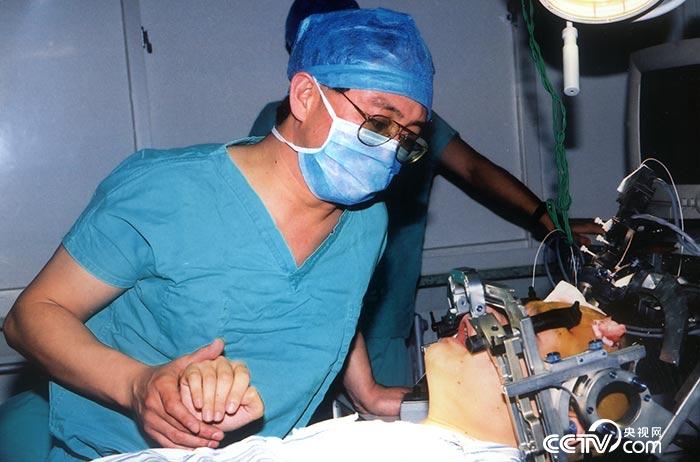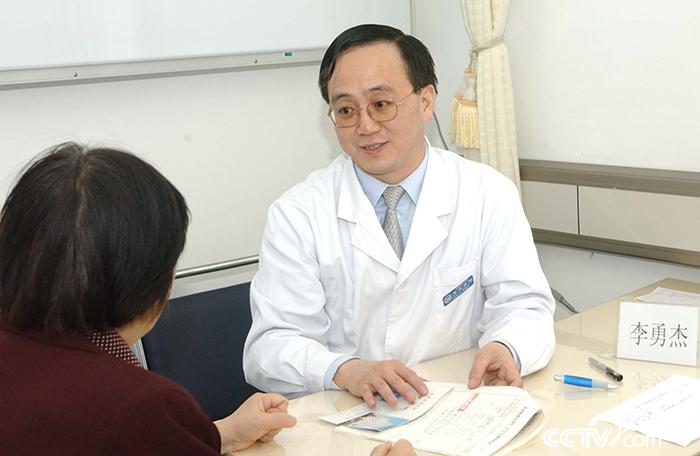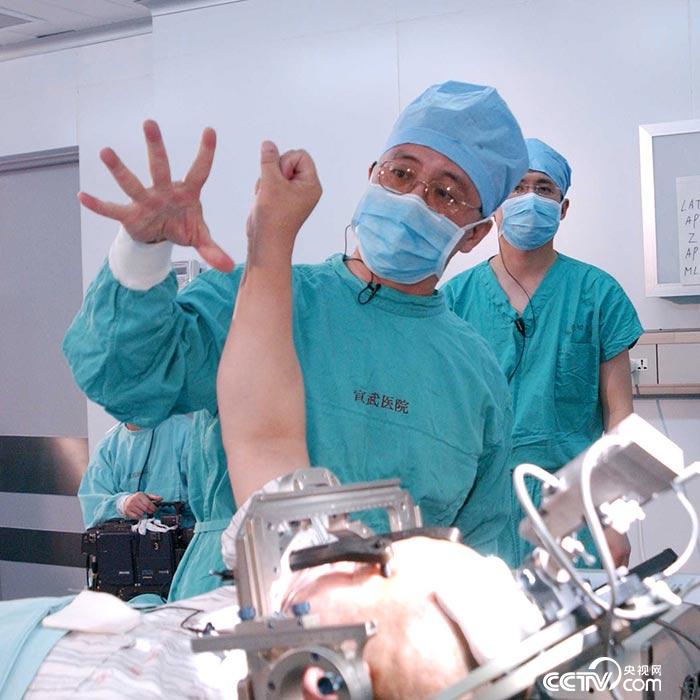Li Yongjie: A doctor and a scientist.
From Johns Hopkins Hospital to xuanwu hospital of Capital Medical University, from an excellent medical expert to an outstanding academic leader; For the first time more than ten years ago, he represented the cutting-edge technology of functional encephalopathy treatment.The technology of "Cell Knife" was introduced from the United States to China, which greatly improved the efficiency of surgical treatment of Parkinson’s disease. After the magical "Cell Knife" treatment, the muscles of thousands of patients in China stopped shaking and stiff, and their lost ability to live and work was restored.
He is Li Yongjie, director of functional neurosurgery at xuanwu hospital of Capital Medical University, with China on his head.The halo of the first person in the "cell knife" should be refined into a "scientist doctor".
Go out and see different scenery.
Li Yongjie was born in last century.60An intellectual family in the s.1979In 2008, my mother said, "It would be nice to have a doctor in our family, so you should study medicine!" " Let Li Yongjie accompany medicine for a lifetime.. heTake the first place in the school and get into Beijing Medical College.,After graduation, he chose to study under the famous neurophysiologist Professor Qiao Jiantian for postgraduate study.1991In 2000, he got a doctor’s degree in medicine and stayed in the affiliated hospital of Shanxi Medical University.

Everything seems to settle down in this way, but the more professional knowledge grows, the more clearly Li Yongjie feels that his vision is narrow. Can’t persuade to give up the dream that I haven’t forgotten in my heart.— — When going abroad, you should go out and feel the different scenery outside.1994In the summer of 2008, Li Yongjie came to the Department of Neurosurgery of Johns Hopkins Hospital to do postdoctoral research. Here, Li Yongjie approached the international forefront of microelectrode-guided stereotactic neurosurgery at that time, and the stable, long-term and immediate surgical effect deeply attracted him.
He still clearly remembers a female patient with primary tremor from Maryland. It was a thalamototomy that day. After the brain was accurately located, the damage began. Within a few seconds, the severe tremor of the patient’s right hand disappeared. When Li Yongjie asked her how she felt, she didn’t say a word, staring at her hand for a long time, and her eyes suddenly burst into tears:“ oh,it stopped. Look,after 10 years! Oh,my God! "(Oh, it stopped.10Years, my god.!)。 That is, from then on, Li Yongjie realized that his attention and interest were converging on stereotactic technology.
In those days, he was fascinated by reading monographs and documents on stereotactic neurosurgery and devoted more and more energy to clinic. Every operation day, it must besixGet up at 8 o’clock, he eats breakfast while driving, in the morning.sevenArrive at the hospital before o’clock.CTRoom. As soon as the patient arrives, help to install the stereotactic headstock and observe it.CTPositioning, and then aboutfive~sixIntraoperative electrophysiological function localization in hours. In addition, Li Yongjie also tried his best to find time to go to the ward to observe the patients after operation, and to understand the relationship between the surgical effect and the accuracy of intraoperative positioning, as well as the direction of improvement in the future … … Do these "extra jobs" wholeheartedly.
1995yearthreeIn May, Li Yongjie stared at the world-famous California through the pictures broadcast on TV.Loma LindaNeurosurgeon, University Medical CenterRobert P.IaconoThe professor operated on a patient with Parkinson’s disease with a "cell knife". With his skills in neurophysiology, Li Yongjie noticed a detail on the TV screen — — Intraoperative electrical signal noise is too high. Li Yongjie concluded that the setting of electrophysiological system may be unreasonable, which is not suitable for the operating room environment interfered by high-frequency electrotome and needs better shielding. That night, he wrote toIaconoProfessor, frankly talked about his views on technical improvement. This bold move has caused Li Yongjie toIaconoThe professor’s attention, quickly replied to his letter, and sent a job invitation. Li Yongjie finished his postdoctoral study ahead of schedule with excellent results, and shouldLoma LindaThe invitation of the University Medical Center came from Maryland on the east coast of the United States to Southern California on the west coast, and devoted himself wholeheartedly to clinical treatment.
In this way, Li Yongjie approached the international forefront of microelectrode-guided stereotactic neurosurgery at that time, commonly known as"Cell knife" technology. He was deeply shocked and impressed by the "cell knife" when he witnessed countless successful operations and witnessed too many Parkinson’s patients who stood up again from their wheelchairs.
Return to the motherland to sow the ideal seeds
At the beginning of coming to the United States, Li Yongjie’s goal was to be a neurosurgeon. Because in the research of basic medicine, China has not been able to keep up with the advanced level in the world in many aspects, and he hopes that he can do his bit to change this situation. But withWith the application of "Cell Knife", Li Yongjie found that since the advanced technology was in front of him, wouldn’t it be a more effective shortcut if he could master it and use it to serve the motherland?

1998In, Li Yongjie resolutely returned to China. Speaking of this work for more than 10 years, Li Yongjie smiled faintly. "Cell knife was only a few years ago, and we have already begun to use more cutting-edge technical means to treat more diseases." Li Yongjie is constantly thinking about the way forward: China has introduced many advanced technologies from the world, but after a period of time, it has been left behind by the world. The reason is very simple. Without the corresponding mechanism of technological innovation and progress, the old capital of advanced technology has been eaten up, and naturally it has fallen behind.
Parkinson’s article"Fish" will be eaten up one day, and it is necessary to weave a net for "fishing". The surgical treatment of Parkinson’s disease is not limited to pallidotomy and thalamototomy, and the indications of surgical techniques are not limited to Parkinson’s disease, a movement disorder. Li Yongjie’s goal for himself is to be a scientist-type doctor: "Not a simple doctor, but to do research and innovation, to have a scientist’s mind, and what he makes is not commonplace".
Building "China Team" of Functional Neurosurgery
Among many patients, there are countless families who have traveled all over the country to see their families. Every time I meet such a doctor, Li Yongjie’s heart is very heavy. After several considerations, Li Yongjie put forwardThe concept of "terminal". "I hope I can tell patients not to go to the hospital in a hurry. It can’t be solved here, and there will be no better way elsewhere." Li Yongjie hopes to give these patients a belief and make them feel more at ease. Li Yongjie knows very well in his heart that if patients and even colleagues really agree with their concept of "terminal station", they must expand the connotation and extension of functional neurosurgery and weave the net of "fishing" bigger and denser.
Li Yongjie led his team to keep track of the latest development of functional encephalopathy in the world, improve technical methods, improve the level of treatment and expand the scope of treatment.1999yearthreeIn May, the Institute of Functional Neurosurgery successfully treated Parkinson’s disease with subthalamic nucleus destruction technology, and in the same year, it also developed deep brain stimulation technology (brain pacemaker therapy) to treat Parkinson’s disease.1999yearfiveIn June, the first operation of generalized torsion spasm was successful.1999In the second half of 2006, the first operation of spastic torticollis, chorea and Tourette’s syndrome was successful one after another.

After creatively expanding the scope of surgical treatment to other dyskinesia diseases, Li Yongjie began the work of surgical treatment of epilepsy and pain, which has been extended to.30A variety of functional encephalopathy. With the increasing fame, Li Yongjie’s concept of "terminal" has been recognized by more and more people, and there are countless patients who come here.
Zhang Guizhong is a patient with Parkinson’s disease.11In 2000, he always relied on drugs to control his illness, but with the development of his illness, his trembling became more and more serious and he could not take care of himself. The side effects of drugs are getting bigger and bigger, and he can only stay in bed after taking drugs. The son who joined the army was forced to leave the army and go home to take care of his father. Director Li Yongjie performed deep brain stimulation surgery for him, successfully implanted a brain pacemaker, and his condition was well controlled. When Zhang Guizhong, who had been trembling for many years, walked out of the ward smoothly, his family shed tears of joy.
Now,The more patients are treated, the more Li Yongjie feels that even if he has great skills, the number of people who can be treated is extremely limited. Only by creating a world-class functional neurosurgery."China Team" can benefit more patients. So he focused on building a world-class functional neurosurgery "China Team". When he chooses a "team player", he has a high demand for character. "The most fundamental thing is that he must be a good man, be honest and have a good view of right and wrong. Without kindness, he will not treat his colleagues and patients well; Without cooperation and integrity, there will be no team spirit. "
Li Yongjie said that to be a trustworthy doctor, the first thing is"Benevolent people love others" and have a heart of kindness. He often tells himself to be in awe of the brain tissue that has evolved under the scalpel for millions of years. Over the years, he and his team have worked hard to create and practice this concept, so that patients can get world-class treatment, the most humanized service and the most determined psychological support.
At present,functional neurosurgeryalreadyIt has mushroomed in major hospitals all over the country, benefiting many patients with functional diseases of nervous system, and making functional neurosurgery take root in China, keeping pace with the world and even surpassing the world’s development level. (Source: National Health Planning Commission)